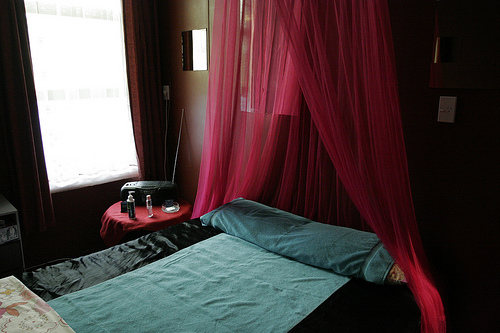
Being called a “slut”, “thevadiya”, “sundal”, “whore”, or “jalang” are probably the worst forms of verbal abuse anyone, woman or man, can inflict on a woman or girl. But they needn’t be. One only needs to unpack the toxicity in the abusive usage of the word which will expose some uncomfortable truths about our relationship with sex and sexuality to understand why. Every time a person uses it as an insult they perpetuate an ancient double standard that refuses to go away – that a promiscuous or sexually active unmarried woman is worthy of disrespect while a man who leads a similar life is likely to receive macho backslaps of praise. Women and girls are seen as the “moral guardians” of society and pose as a sexual threat regardless of age and marital status she may be, whether she’s a virgin or not.
This means that a female-identified person are in danger of being called a slut or sundal for any reason; when she speaks her mind she’s a slut, if she doesn’t wear a tudung she’s a slut, when she breaks a rice bowl she’s a stupid slut. It is no exaggeration that these are the words used to bully women and girls into silence and submission.
Truth be told, many women and girls do not like words like “sundal” and “slut” despite the Slutwalks that are take place across the globe. And that is mainly because no one wants to identify as or with sex workers or to use the stigmatising term, prostitute. But we little do we realise that the history of female sexuality in Malaysia is intimately linked with the dehumanising laws regulating the colonial sex industry in Malaya.
British colonialism in the late 19th century Malaya was mired in racism against migrant labourers brought in from mainland China who were deemed as lacking morals and homophobia against homosexual activities that occurred between them. To curtail homosexual practices, the colonial authorities introduced female sex workers, trafficked or otherwise, to the labourers and colonial officers alike. By 1900, there were around ten thousand female sex workers in the Straits settlements. Numbers in the Malay states were less easy to estimate due to lack of surveillance and regulation.
Viewed as vectors of venereal disease, female sex workers in British Malaya were subjected to the Women and Girls Protection Act (WGPA) that stipulated compulsory medical examination and detainment followed by forced treatment if women were found with disease. Today, along with various other colonial legal relics, the WGPA 1973 is used to detain young women under 21 for up to three years for “immoral” activity. According to the WCC, the act has mainly been used to round up young women in karaoke bars and leaving their male company unscathed. The assumption behind such arrests is that young women’s sexual morality need to be “protected” from the deathly threat of moral corruption.
The intertwining histories of the colonial sex industry and the sexuality in present day Malaysia urge us to close the gap between the virgin-whore dichotomy that gives words like “jalang” and “slut” their potency. We can start with respecting sex workers as workers and as women who are more than just what they do in a sexual/business transaction. We can end the stigma behind words like “pelacur” and disarm the slurs inflicted on people who are not sex workers.
Malaysia is not unique in our relentless punishment against the women and men in the sex industry.
In countries where prostitution is illegal and / or penalises its clientele, sex work often ends up persisting anyway but in more deadly and dehumanising forms. Outlawed sex industries go underground, increase the trafficking of women and girls and incidences of sexual violence, making it impossible for them to leave the profession, deaths and abuse go unreported, sex workers do not get medical treatment or health checks which increases the likelihood of dangerous sexually-transmitted diseases – all because the criminalisation of sex work purports to “shield” women, girls, and society from the “evils” of sex work. The evil is not inherent in sex work itself but rather in the abuse perpetrated by violent pimps, johns, traffickers, and the law.
Respecting sex workers allows them to leave the industry as they wish through humanitarian laws and anti-discriminatory employment practices, destigmatises paid sex, turn them into our sisters and brothers, and welcomes them into the fray of society as people. Women and girls must refuse playing hostage to the toxicity of words like “sundal” or “whore” and end the moral double standard that punishes us for having the conceit to have sexual desire.
The reason why we hate or use these words as terms of abuse is because deep down, we still think that being sexual outside of marriage is “bad” and “shameful” and that healthy female sexuality is “unnatural”. And as we discuss the topic of gendered slurs, the global Slutwalk marches on, neutralising and reclaiming the word “slut” at the heart of its anti-rape agenda. What Slutwalk does to the word “slut” is taking the negative power from sexist cultures and having the freedom to twist, subvert, reclaim, and/or detoxify it. Make gendered terms of abuse obsolete and we will disarm the simplest act of abuse against all women and girls whether they are sex workers and not.


This is a very touchie subject and one that occurs around the world. People dont treat these women fairly.
Female Lust
This is a very touchie subject and one that occurs around the world. People dont treat these women fairly.
Female Lust
I want work in sexy movies I am male . Can you help me ?
Awesome. Very angry and bitchy yet warm and fuzzy. :)
Just an extra note – the Women and Girls Protection Act 1973 has been repealed by the Child Act 2001.
Thanks! and thanks for the extra (rather crucial) info.
Nice!
Thank you, Pepper!